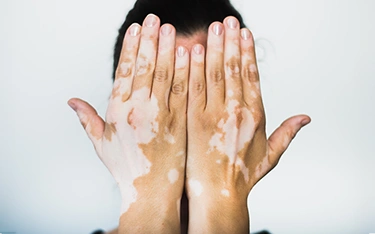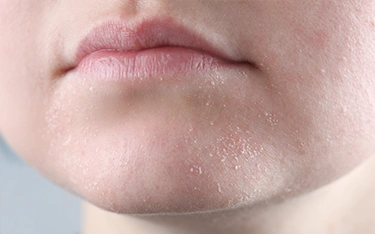Imagine an itch that just won't quit. A constant, nagging discomfort that seems to settle right at the crown of your head. Now, picture flakes, not the charming, snowy kind, but stubborn, silvery scales that refuse to budge. These are typical scalp psoriasis symptoms, and if this sounds familiar, you're not alone. Scalp psoriasis early symptoms often get mistaken for dandruff, but unlike regular flakes, they come with persistent itching, redness, and irritation.
Over time, these may progress into visible hair psoriasis symptoms, making the condition harder to manage. Symptoms of scalp psoriasis, sometimes referred to as psoriasis symptoms in the head, are not just a physical nuisance, they can also take a real toll on your confidence. Scalp psoriasis, a chronic skin condition, casts a wide net, affecting millions globally and, surprisingly, a significant slice of India's population. That persistent itch and those visible scales are more than just a skin concern; they can impact your daily life and self-esteem.
Recognising the Symptoms of Scalp Psoriasis
Scalp psoriasis can manifest in various ways, and symptoms may range from mild discomfort to severe inflammation. Recognising the early signs can lead to timely intervention and improved management.
Early Symptoms Scalp Psoriasis Symptoms:
- Mild redness or irritation may be mistaken for dandruff
- Slight flaking with a dry, itchy scalp
- Small patches of scaling that can gradually spread
Other Common Symptoms of Scalp Psoriasis:
- Thick, red patches on the scalp, often extending beyond the hairline
- Silvery-white scales resembling severe dandruff
- Persistent itching and burning, which worsens with scratching
- Cracked or bleeding skin due to excessive dryness
- Temporary hair shedding triggered by inflammation and scratching
- Scalp tenderness in affected areas
How Scalp Psoriasis Is Diagnosed
Diagnosing scalp psoriasis typically begins with a visual examination by a dermatologist. They will look for characteristic scalp psoriasis symptoms, such as red, inflamed patches covered with silvery-white scales. You might also notice hair psoriasis symptoms, where the scales can extend into the hairline or even affect the hair follicles, leading to temporary hair loss in affected areas. Doctors will consider your medical history and inquire about any psoriasis symptoms in the head or other parts of the body.
Recognising early symptoms of scalp psoriasis is key; these can include mild itching, dryness, or small, red scaly bumps that may not immediately appear as classic scales. The dermatologist will also differentiate it from other scalp conditions like dandruff or seborrheic dermatitis, based on the distinct appearance of the lesions and the presence of other psoriasis symptoms. Essentially, the diagnosis relies on identifying the specific symptoms of scalp psoriasis and understanding the pattern of the symptom of psoriasis in the scalp that differentiates it from other conditions. A Wood’s lamp helps distinguish between psoriasis and seborrhoeic dermatitis.
How Does Scalp Psoriasis Differ from Dandruff?
|
Feature
|
Scalp Psoriasis
|
Dandruff
|
|
Cause
|
Autoimmune condition that speeds up skin cell turnover.
|
Caused by Malassezia yeast, oily skin, or sensitivity to hair products.
|
|
Appearance
|
Thick, silvery-white scales, redness, and inflamed patches. (scalp psoriasis symptoms explained).
|
White or yellowish, greasy flakes without thickened skin.
|
|
Early Signs
|
Scalp psoriasis early symptoms include itching, red, and scaly patches before thick plaques form.
|
Mild flaking and itchiness that often worsen with oily scalp.
|
|
Location
|
Can extend beyond the hairline, forehead, back of the neck, or ears (psoriasis symptoms in head).
|
Limited to scalp and hair-bearing areas.
|
|
Severity
|
Persistent and chronic, with cycles of flare-ups.
|
Usually mild, manageable with anti-dandruff shampoos.
|
|
Other Symptoms
|
May include bleeding when scales are scratched off (hair psoriasis symptoms and symptoms of psoriasis in the scalp).
|
Rarely causes pain, bleeding, or thick scaling.
|
|
Diagnosis
|
Requires dermatologist evaluation to confirm what are the symptoms of scalp psoriasis.
|
Self diagnosis is not possible. Its best suggested to consult a physician for early diagnosis of the condition.
|
Scalp Psoriasis: Causes, Triggers & Early Prevention
Scalp psoriasis is an autoimmune disorder in which the immune system mistakenly attacks healthy skin cells, accelerating skin cell turnover. This results in the formation of thick, scaly patches on the scalp.
Common Causes of Scalp Psoriasis Include
- Genetics: A family history of psoriasis increases the risk
- Environmental Factors: Pollution, allergens, and weather changes can worsen symptoms
- Immune System Dysfunction: Overactive immune responses cause rapid skin cell buildup
- Medications: Beta-blockers, antimalarials, and lithium may trigger flare-ups
Main Factors That Worsen Scalp Psoriasis
Several external and lifestyle factors can aggravate scalp psoriasis symptoms:
- Cold Weather: Winter dryness can worsen scaling and itching
- Stress: A leading trigger for flare-ups, chronic stress intensifies inflammation
- Diet & Lifestyle: High consumption of processed foods, alcohol, and smoking can exacerbate symptoms
- Harsh Hair Products: Frequent use of chemical-based shampoos, dyes, and styling products may irritate the scalp
Shocking Stat! A 2023 study from AIIMS Delhi revealed that 48% of psoriasis patients in India experienced worsening symptoms due to stress. Managing stress through lifestyle changes and homeopathic treatment can help control flare-ups naturally!









